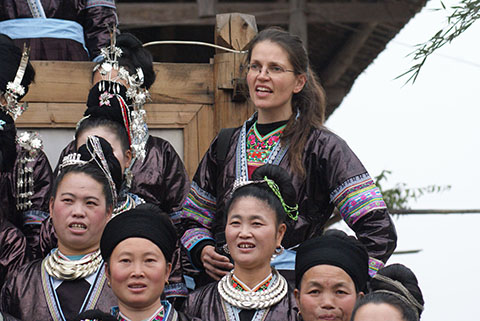

Catherine Ingram
University of Melbourne, Australia
Exchange to Research Institute of Ritual Music in China (RIRMC), Shanghai Conservatory of Music, China
The Endeavour Australia Cheung Kong Research Fellowship that I was awarded in 2010 has provided a very valuable opportunity for me to return here to China for further music research and scholarly interaction. Since taking up the fellowship in November 2010, I have mainly been involved in undertaking field research in rural Kam minority areas of Guizhou Province, southwestern China. As was previously the case for my twenty months of doctoral fieldwork, I have been living with a Kam family in a Kam village in one region well known for its many musical traditions. My research methodology continues to involve improving my ability to speak the Kam language, participating in all kinds of daily village activities, learning Kam songs and performing together with Kam singers in many different performances.
My current research aims to explore and document various different aspects of Kam music-making in greater detail than was possible during my PhD candidacy, and thus more comprehensively understand contemporary Kam musical culture. This research is important as China¡¦s massive social changes of recent decades are threatening the ongoing transmission and therefore survival of Kam musical traditions. Escalating development of cultural tourism may also irrevocably alter those traditions that remain. Hence, one further and important aspect of my current research involves continuing to contribute to the sustainable digital archive that Kam community members and I have established with PARADISEC (www.paradisec.org.au), both with the addition of newly recorded material and of metadata relating to prior recordings.
Besides my fieldwork in Guizhou Province, I have also been involved in other scholarly activities that have been very helpful for my research, with similar activities also planned for the remainder of my Fellowship. At the Research Institute of Ritual Music in China, my host institute at the Shanghai Conservatory of Music, I gave a seminar presentation (in Chinese) on the methodology and results of my recent doctoral research into the Kam ¡§big song¡¨ genre, and also participated in a conference. In February 2011, I was invited to give a guest presentation on contemporary Kam music-making at the Research Colloquium convened by the Department of Music at the University of Hong Kong. The animated discussion in these formal contexts, as well as in subsequent informal discussions, has provided an excellent opportunity to improve my understanding of the research approaches and methodologies used within Chinese-speaking scholarly communities. In March 2011, I will give two guest lectures on Kam musical culture at two major universities in Taiwan, and I will then travel to England to present a paper on Kam music at an international conference. Additionally, two articles that I have been working on as an Endeavour Fellow have been accepted for publication. I have also received an invitation for a book chapter I co-wrote with Kam singers to be translated into Chinese for publication in the journal Miao Dong luntan [China Forum on Hmong and Kam Studies].
I sincerely thank the Cheung Kong Group and the Australian Government for their support in providing this Fellowship, and the members of Kam communities for their ongoing help and encouragement in conducting this research. I would also like to acknowledge the prompt and helpful assistance that I have received from my host supervisor, Professor Xiao Mei, and my Endeavour Case Manager, Kelly Baum. I am most grateful for the opportunity to both conduct this research and also to enhance scholarly communication between researchers in Western academia and those working in various Chinese-language contexts.

(The photograph to accompany this passage should be credited to the photographer, Cao Yang)
© Copyright 2018 CK Group. All rights reserved.
